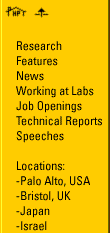| |
HP Labs Technical Reports
Click here for full text:


Minimal-Intelligence Agents for Bargaining Behaviors in Market-Based Environments
Cliff, Dave; Bruten, Janet
HPL-97-91
Keyword(s): autonomous software agents; market-based control; economics; equilibrium price; trading
Abstract: This report describes simple mechanisms that allow autonomous software agents to engage in bargaining behavoirs in market-based environments. Groups of agents with such mechanisms could be used in applications including market-based control, internet commerce, and economic modelling. After an introductory discussion of the rationale for this work, and a brief overview of key concepts from economics, work in market-based control is reviewed to highlight the need for bargaining agents. Following this, the early experimental economics work of Smith (1962) and the recent results of Gode and Sunder (1993) are described. Gode and Sunder's work, using "zero-intelligence" (ZI) traders that act randomly within a structured market, appears to imply that convergence to the theoretical equilibrium price is determined more by market structure than by the intelligence of the traders in that market: if this is true, developing mechanisms for bargaining agents is of very limited relevance. However, it is demonstrated here that the average transaction prices of ZI traders can vary significantly from the theoretical equilibrium level when supply and demand are asymmetric, and that the degree of difference from equilibrium is predictable from a priori statistical analysis. In this sense, it is shown here that Gode and Sunder's results are artefacts of their experimental regime. Following this, 'zero- intelligence-plus' (ZIP) traders are introduced: like ZI traders, these simple agents make stochastic bids. Unlike ZI traders, they employ an elementary form of machine learning. Groups of ZIP traders interacting in experimental markets similar to those used by Smith (1962) and Gode and Sunder (1993) are demonstrated, and it is shown that the performance of ZIP traders is significantly closer to the human data than is the performance of Gode and Sunder's ZI traders.
128 Pages
Back to Index
|




